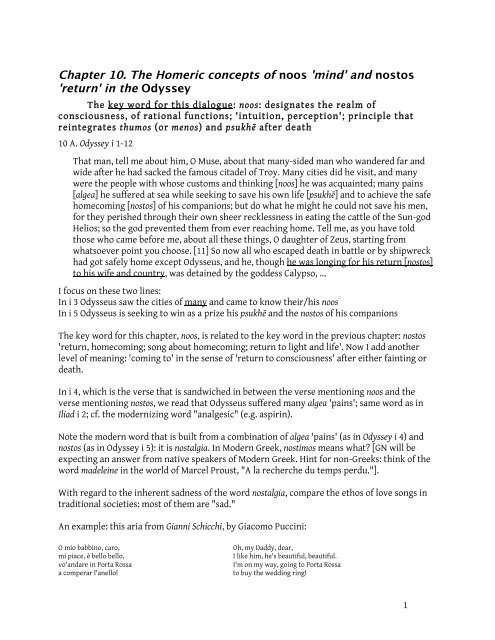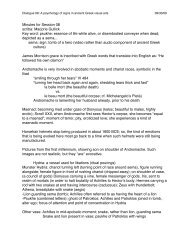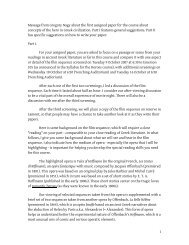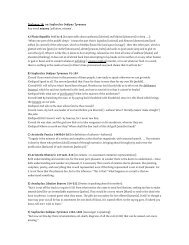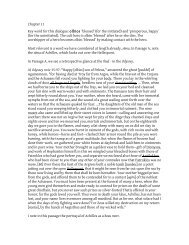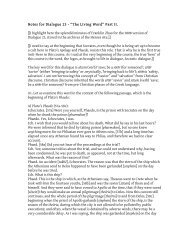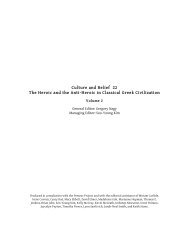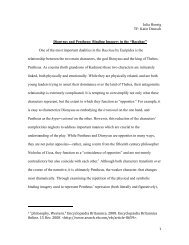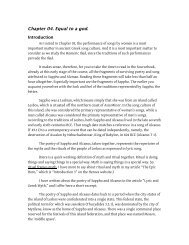Chapter 10 pdf
Chapter 10 pdf
Chapter 10 pdf
Create successful ePaper yourself
Turn your PDF publications into a flip-book with our unique Google optimized e-Paper software.
<strong>Chapter</strong> <strong>10</strong>. The Homeric concepts of noos 'mind' and nostos<br />
'return' in the Odyssey<br />
The key word for this dialogue: noos: designates the realm of<br />
consciousness, of rational functions; 'intuition, perception'; principle that<br />
reintegrates thumos (or menos) and psukhē after death<br />
<strong>10</strong> A. Odyssey i 1-12<br />
That man, tell me about him, O Muse, about that many-sided man who wandered far and<br />
wide after he had sacked the famous citadel of Troy. Many cities did he visit, and many<br />
were the people with whose customs and thinking [noos] he was acquainted; many pains<br />
[algea] he suffered at sea while seeking to save his own life [psukhē] and to achieve the safe<br />
homecoming [nostos] of his companions; but do what he might he could not save his men,<br />
for they perished through their own sheer recklessness in eating the cattle of the Sun-god<br />
Helios; so the god prevented them from ever reaching home. Tell me, as you have told<br />
those who came before me, about all these things, O daughter of Zeus, starting from<br />
whatsoever point you choose. [11] So now all who escaped death in battle or by shipwreck<br />
had got safely home except Odysseus, and he, though he was longing for his return [nostos]<br />
to his wife and country, was detained by the goddess Calypso, ...<br />
I focus on these two lines:<br />
In i 3 Odysseus saw the cities of many and came to know their/his noos<br />
In i 5 Odysseus is seeking to win as a prize his psukhē and the nostos of his companions<br />
The key word for this chapter, noos, is related to the key word in the previous chapter: nostos<br />
'return, homecoming; song about homecoming; return to light and life'. Now I add another<br />
level of meaning: 'coming to' in the sense of 'return to consciousness' after either fainting or<br />
death.<br />
In i 4, which is the verse that is sandwiched in between the verse mentioning noos and the<br />
verse mentioning nostos, we read that Odysseus suffered many algea 'pains'; same word as in<br />
Iliad i 2; cf. the modernizing word "analgesic" (e.g. aspirin).<br />
Note the modern word that is built from a combination of algea 'pains' (as in Odyssey i 4) and<br />
nostos (as in Odyssey i 5): it is nostalgia. In Modern Greek, nostimos means what? [GN will be<br />
expecting an answer from native speakers of Modern Greek. Hint for non-Greeks: think of the<br />
word madeleine in the world of Marcel Proust, "A la recherche du temps perdu."].<br />
With regard to the inherent sadness of the word nostalgia, compare the ethos of love songs in<br />
traditional societies: most of them are "sad."<br />
An example: this aria from Gianni Schicchi, by Giacomo Puccini:<br />
O mio babbino, caro,<br />
mi piace, è bello bello,<br />
vo'andare in Porta Rossa<br />
a comperar l'anello!<br />
Oh, my Daddy, dear,<br />
I like him, he's beautiful, beautiful.<br />
I'm on my way, going to Porta Rossa<br />
to buy the wedding ring!<br />
1
Si, si, ci voglio andare!<br />
E se l'amassi indarno,<br />
andrei sul Ponte Vecchio<br />
ma per buttarmi in Arno!<br />
Mi struggo e mi tormento,<br />
O Dio! vorrei morir!<br />
Yes, yes, I want to go there,<br />
And if I loved him in vain,<br />
I will go to the Old Bridge<br />
but only to throw myself into the Arno.<br />
I struggle and I am tormented<br />
Oh, God! I want to die!<br />
Back to the subject of noos... Consider the positive and the negative values built into the names<br />
Antinoos and Alkinoos: their names mean, respectively: 'he who is opposed to bringing back to<br />
light and life' and 'he who has the power to bring back to light and life'<br />
Both words, noos and nostos, are derived from the Indo-European root *nes- 'return to light and<br />
life' (Greek is one of many Indo-European languages; other IE languages are Latin, Sanskrit,<br />
Hittite, etc.); from Indo-European languages other than Greek, we see that this root *nes-<br />
occurs in myths having to do with Morning Star / Evening Star.<br />
The meanings of noos and nostos are relevant to the overall plot of the Homeric Odyssey.<br />
The surface meaning of Odyssey: safe return from war, safe return from the sea.<br />
The underlying meaning of Odyssey: safe return from death; this implicit theme is made<br />
explicit in Theognis 1123-1124:<br />
Do not remind me of my misfortunes! The kinds of things that happened to Odysseus<br />
have happened to me too.<br />
Odysseus, who returned, emerging from the great palace of Hades,<br />
and who then killed the suitors with a pitiless thûmos.<br />
The most easily perceived connection of the two words noos and nostos: Odyssey ix 82-<strong>10</strong>4, about<br />
the Land of the Lotus-Eaters: if you lose the "implant" of homecoming in your mind, you<br />
cannot go home because you no longer know what home is.<br />
Here is another negative threat to noos and nostos... Odyssey x 190-202, to which Fitzgerald<br />
refers as an “island nightmare.” In the book Best of the Achaeans, I speak of Iliadic nightmares in<br />
the Odyssey... It is about the disorientation of Odysseus and his companions. The metaphor of<br />
orientation recapitulates noos / nostos. And disorientation recapitulates the negation of noos /<br />
nostos. The disorientation is described in this passage:<br />
<strong>10</strong> B. Odyssey x 190-202<br />
'My friends, we are in very great difficulties; listen therefore to me. We have no idea where<br />
the sun either sets or rises, so that we do not even know East from West. I see no way out of<br />
it; nevertheless, we must try and find one. We are certainly on an island, for I went as high<br />
as I could this morning, and saw the sea reaching all round it to the horizon; it lies low, but<br />
towards the middle I saw smoke rising from out of a thick forest of trees.' [198] Their hearts<br />
sank as they heard me, for they remembered how they had been treated by the<br />
Laestrygonian Antiphates, and by the savage ogre Polyphemus. They wept bitterly in their<br />
dismay, but there was nothing to be got by crying.<br />
2
Is there a difference between the pains of the Iliad and Odyssey? For an answer, consider this<br />
passage...<br />
<strong>10</strong>C. Odyssey iv 219-226<br />
Then Zeus’ daughter Helen bethought her of another matter. She drugged the wine with an<br />
herb that banishes all care, sorrow, and ill humor. Whoever drinks wine thus drugged<br />
cannot shed a single tear all the rest of the day, not even though his father and mother<br />
both of them drop down dead, or he sees a brother or a son hewn in pieces before his very<br />
eyes.<br />
In the original Greek Helen's drug is called nēpenthes ('non-penthos') and is described as<br />
a-kholon (literally, 'without kholos'; kholos = 'anger'). Note that the son of Menelaos, at the<br />
beginning of Odyssey iv, is named Megapenthēs.<br />
The drug nēpenthes is meant to cancel the penthos of the Iliad... Here I repeat from the previous<br />
dialogue the passage about the "return" to the song of Troy:<br />
<strong>10</strong>D. Odyssey viii 514-534<br />
Then he [= the singer] sang how the sons of the Achaeans issued from the horse, and sacked<br />
the town, breaking out from their ambuscade. He sang how they overran the city here and<br />
there and ravaged it, and how Odysseus went raging like Ares along with Menelaos to the<br />
house of Deiphobos. It was there that the fight raged most furiously, nevertheless by<br />
Athena’s help he was victorious. [521] All this he told, but Odysseus was overcome as he<br />
heard him, and his cheeks were wet with tears. He wept as a woman weeps when she<br />
throws herself on the body of her husband who has fallen before his own city and people,<br />
fighting bravely in defense of his home and children. She wails aloud and flings her arms<br />
about him as he lies gasping for breath and dying, but her enemies beat her from behind<br />
about the back and shoulders, and carry her off into slavery, to a life of labor [ponos] and<br />
sorrow, and the beauty fades from her cheeks—even so piteously did Odysseus weep, but<br />
none of those present perceived his tears except Alkinoos, who was sitting near him, and<br />
could hear the sobs and sighs that he was heaving.<br />
It is significant that Alki-noos, whose name means ‘he whose noos has power’, is the one who<br />
notices the grief of Odysseus. Alkinoos asks Odysseus a pointed question that keeps the focus<br />
on the themes of the Trojan War, the themes of the Iliad:<br />
<strong>10</strong>E. Odyssey viii 567-586<br />
Tell us also why you are made unhappy on hearing about the return of the Argive Danaans<br />
from Troy. The gods arranged all this, and sent them their misfortunes in order that future<br />
generations might have something to sing about. Did you lose some brave kinsman of your<br />
wife’s when you were before Troy? A son-in-law or father-in-law—which are the nearest<br />
relations a man has outside his own flesh and blood? Or was it some brave and kindlynatured<br />
comrade - for a good friend is as dear to a man as his own brother?<br />
3
Such Iliadic themes, like the ‘good friend’ (consider Patroklos in the Iliad), are the themes of<br />
the Sirens in the Song of the Sirens:<br />
<strong>10</strong>F. Odyssey xii 184-191<br />
‘Come here,’ they sang, ‘renowned Odysseus, honor to the Achaean name, and listen to our<br />
two voices. No one ever sailed past us without staying to hear the enchanting sweetness of<br />
our song—and he who listens will go on his way not only charmed, but wiser, for we know<br />
all the ills that the gods laid upon the Argives and Trojans before Troy, and can tell you<br />
everything that is going to happen over the whole world.’<br />
The nostalgic (love song?) Song of the Sirens, xii 184-191, is replete with Iliadic agenda<br />
So how does noos / nostos lead to orientation? Now we go back to celestial dynamics...<br />
returning to the Island Nightmare.<br />
Celestial dynamics: sun sets into the Okeanos (Iliad VIII 485) / and rises from the Okeanos<br />
(Odyssey xix 433-434).<br />
Similarly, the psukhē when it leaves the body “sets” into the Okeanos (Odyssey xx 63ff).<br />
<strong>10</strong> G. Odyssey xii 1-7<br />
After we left behind the stream of Okeanos, and had got out into the open sea, we went on<br />
till we reached the island of Aeaea, where the Dawn has her dwelling and her place to<br />
dance, and where the risings of the sun happen.<br />
Where it all comes together is Odyssey xiii 79-95 the nostos:<br />
<strong>10</strong> H. Odyssey xiii 79-95<br />
Thereon, when they began rowing out to sea, Odysseus fell into a deep, sweet, and almost<br />
deathlike slumber. [81] The ship bounded forward on her way as a four-in-hand chariot<br />
flies over the course when the horses feel the whip. Her prow curved as it were the neck of<br />
a stallion, and a great wave of dark seething water boiled in her wake. She held steadily on<br />
her course, and even a falcon, swiftest of all birds, could not have kept pace with her. Thus,<br />
then, she cut her way through the water, carrying one who was as cunning as the gods, but<br />
who was now sleeping peacefully, forgetful of all that he had suffered both on the field of<br />
battle and by the waves of the weary sea. [93] When the bright star that heralds the<br />
approach of dawn began to show, the ship drew near to land.<br />
4


